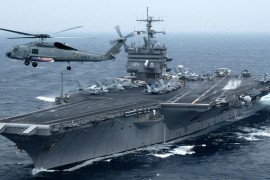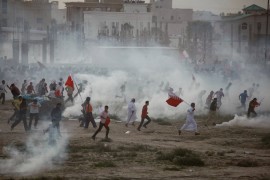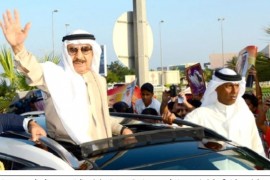A file handout picture made available September 29, 2009 by the Bahrain News Agency (BNA) shows Sheikh Nasser bin Hamad al-Khalifa, son of Bahrain’s Emir Sheikh Hamad bin Khalifa, during his wedding ceremony. A British judge said on October 7, 2014 that Prince Nasser did not have legal immunity from prosecution following a review requested by a Bahraini torture survivor. (Photo: AFP-BNA)
By: Abbas Bu-Safwan
Published Thursday, October 9, 2014
The British high court’s decision to strip Prince Nasser bin Hamad al-Khalifa of diplomatic immunity destroys the hopes of the king’s fourth son of assuming a senior position in the ruling establishment of Bahrain. Despite all the support that the son receives, it now seems difficult for Nasser to be the crown prince or prime minister or even defense minister.
King Hamad and his advisors among al-Khawaled (a branch of the Khalifa family) were preparing Nasser for these positions for a decade amid public uncertainty among members of the ruling family and regime supporters of the ability of the crown prince, Salman bin Hamad, to preserve the rule of the Khalifa family. That is why it is safe to say that of all the Khalifas, the crown prince seems the happiest with the ruling against his half brother and main rival among his six brothers, the king’s offsprings with his three wives. (See “The Hidden Conflict: The future of the order of succession in Bahrain”).
The British court’s decision can be described as historical because it is the first of its kind that opposition parties were able to mount against a Gulf sheikhdom that enjoys a close relationship with the British crown. Let’s not forget that the British authorities managed to delay Nasser’s trial on charges of torture for about three years claiming that the son of the Bahraini king enjoys immunity that prevents his prosecution before the courts since he is a member of the ruling al-Khalifa family. This claim, however, was refuted by the recent British court ruling.
The ruling of the high court in London could serve as the basis for European courts to agree to look into accusations of torture leveled against Nasser [bin Hamad al-Khalifa]. The court ruling, which was highly publicized by international media outlets, will open the procedural door for trying the pampered son in the courts of the United Kingdom as well as in European courts. The ruling of the high court in London could serve as the basis for European courts to agree to look into accusations of torture leveled against Nasser. The British court ruling might also open the door on the possibility – difficult but worth considering – of other countries handing Nasser over to the London police.
Nevertheless, it must be said that the road is still long before Nasser ends up in prison or receives a suitable punishment as a suspect in torture cases due to the many legal loopholes that the British prosecution might be able to use to its advantage. In the meantime, ties between Britain and the Gulf could prevent the case from reaching its natural outcome of bringing justice to the victims.
What happened so far causes undeniable problems for Prince Nasser and his father as well as his father-in-law Mohammed bin Rashid al-Maktoum, ruler of Dubai and the prime minister of the United Arab Emirates (UAE), who is one of the pillars that Nasser relies on in his dream to assume a leading role in Bahrain.
Nasser’s primary supporter, however, is his father Hamad, who worked for years to make his son a known figure locally and globally by holding many costly public relations parties and ensuring he attains top-ranking positions. Controversial media propaganda tried to present Nasser as a promising youthful leader. However, an error in judgement amid security frenzy and a crazed reaction against those calling for democracy destroyed the dream of the young man and his father.
The mistake that Nasser committed has to do with allegations that he engaged in torture against political prisoners who opposed his father’s tyrannical rule. Here, they refer specifically to opposition figures Mohammed Habib al-Miqdad and Abdallah al-Mahrous who have been detained since March 2011 in the wake of the Saudi intervention in Bahrain, the use of force to break-up the sit-in at the Lulu Roundabout (February 14 – March 16, 2011) and the widespread and disgraceful practice of torture during the state of emergency (March 15 – May 30, 2011).
This, however, cast Nasser on the international arena as an impulsive figure, unable to control his emotions, able to kill in broad daylight and shed blood in front of TV cameras. One may argue that the allegations by Mahrous and Miqdad are based on the claims of an opposition group. Here, however, is where Nasser committed his biggest mistake. The prince took the initiative to talk publicly on Bahraini TV, threatening to retaliate against those calling for toppling the regime. This provided clear material evidence that encouraged eminent British lawyers to take a case for which there is a solid foundation.
It is true that the hardline position that Nasser expressed against calls for democracy strengthened the alliance between the inexperienced young prince and the military forces, al-Khawaled, the centers of influence in the regime, hardline regime loyalists, al-Asalah Islamic Society, al-Fateh Gathering and more importantly, Saudi Arabia the leader of counter-revolutions. This, however, cast Nasser on the international arena as an impulsive figure, unable to control his emotions, able to kill in broad daylight and shed blood in front of TV cameras. While Western advisors counsel their friends the Khalifas to practice repression in a way that is a bit less public and visible.
Perhaps King Hamad is now left with no choice but to admit defeat and abandon his hopes for his pampered son to have a place in a kingdom that he wanted with two leaders, Crown Prince Salman and Nasser. This does not mean that the road is now paved for the crown prince who does not have the trust of the Sunni loyalists and has no clear support within the military institution.
http://english.al-akhbar.com/content/bahraini-opposition-wins-symbolic-victory-over-ruling-family




